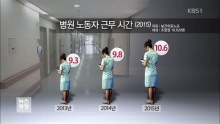South Korea: Survey finds hospitals are still a blind spot for maternity protection
05 September 2016

20,950 workers in 110 hospitals nationwide responded to the survey.
The survey found that:
- Out of 6,474 respondents who are eligible for childcare leave, only 41.3% of them (2,671) reported using such leave. While 42.6% in public hospitals used the leave, only 38.8% in private hospitals did so, and the average leave period was reported as 10.8 months, or less than one year.
- 20.7% of respondents who failed to use the childcare leave blamed it on the lack of personnel and possible burden on their colleagues, and 23.8 % on the unspoken pressure inside hospitals.
- Women workers in Korea have a right to use the menstruation leave once a month as per the Labor Standard Law, but the average days of menstruation leave used was 4.9 days (5.2 days in public hospitals and 4.7 days in private hospitals) per year.
- On healthcare workers’ pregnancies and delivery patterns, 3.8% of respondents said they used unwanted birth control; 8.4% were forced to follow the pregnancy rotation system; 3.6% performed night shift work even after being pregnant; and 2.9% experienced either miscarriages or stillbirths. This was all due to the shortage of healthcare personnel.
- Among OECD countries on average, 9.3 nurses are available for 1,000 patients. By contrast in Korea, only 4.8 nurses (including nurse assistants), half of the OECD average, serve 1,000 patients. Young women workers are forced to leave their workplace due to childbirth and childcare as there is no policy to support them at hospitals. As of 2015, the number of licensed nurses was 307,797 while the number of practicing nurses was only 135,400 (only 44% of the total qualified nurses).
- The government is currently implementing a policy for a ‘reduction in working hours during pregnancy’. The policy took effect in March 2016. According to the policy, every hospital should shorten the working hours of pregnant workers by up to 2 hours per day upon the request of the worker. However, only 11.6% of hospitals have reported that the policy has actually been used. For those hospitals that should be open 24/7, the policy is deemed not practical.
- Based on these survey results, KHMU will become more active in expanding maternity protections. KHMU will call for an “employment system that’s created with considerations of the possible shortage of personnel left by childbirth and childcare leaves” so that hospitals hire and maintain a sufficient workforce at any time.
KHMU will also be holding a series of strike actions late September calling for sufficient number of healthcare workers in hospitals.

